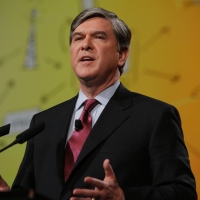FCC Makes NAB an Offer It Can’t Refuse

The smarter way to stay on top of broadcasting and cable industry. Sign up below
You are now subscribed
Your newsletter sign-up was successful
FCC Chairman Julius Genachowski said almost all the right things to attendees gathered in Las Vegas last week for the National Association of Broadcasters show. But between that “almost” and some kind of full understanding of the FCC’s ultimate plans for broadcasting, a gulf of 120 MHz of spectrum—and unanswered questions—remains.
In the wake of the show, it was still not clear what the FCC would do if its voluntary spectrum proposal did not pan out as planned. Broadcasters were left essentially where they had begun, touting their future as a player in the broadband future, with a number of them planning in earnest for mobile DTV service.
Genachowski’s warmup act was the keynote speech of NAB President Gordon Smith, who a day earlier had all but compared the chairman to Don Corleone (“an offer they can’t refuse”) of Godfather fame.
Smith quoted from the chairman’s own broadband plan report: “The government’s ability to reclaim, clear and re-auction spectrum is the ultimate backstop against market failure and is an appropriate tool when a voluntary process stalls entirely.”
“This sounds,” Smith said, echoing his interview with this magazine the week before, “about as voluntary as Marlon Brando saying…that he wanted either the guy’s signature or his brains on the contract.”
Genachowski followed up the next day with a speech full of grace notes about his former life as a broadcaster at Barry Diller’s USA Broadcasting, and the value of broadcast news and emergency information. Further, he insisted that the spectrum reclamation plan—intended to get 120 MHz back from broadcasters by 2015 via incentive auctions that would cut them in for a piece of the action, as it were—will not require much spectrum from many broadcasters to be successful.
The one thing missing for broadcasters was clarity on what would happen if a voluntary process comes to a halt. The chairman said he did not think that would happen—or would be allowed to happen. “I don’t believe it will come to that, or that our country can afford for it to come to that,” he said. Genachowski asked broadcasters to “move beyond inside-the-Beltway debates and tactics”—both the FCC and the NAB are headquartered inside said highway— and “ignore the hyperbole” and focus on the “real” challenges and “real opportunities.”
Smith said afterward that he was “reassured” by the chairman’s talk, particularly his call for sitting down and reasoning together, including convening a group of broadcast engineers and others to help. But other broadcasters were not so generous with their assessments.
Cox Media Group President Sandy Schwartz said he got “a little kick” out of the call for broadcasters to ignore hyperbole. “I think some of the excitement is coming from both sides, not just from broadcasters but from the FCC,” he said.
“No, I was not comforted” by Genachowski’s talk, Schwartz added. “I think this is consistent with what he has been saying, and I think we have been fairly consistent in what we are saying. But speeches don’t do a lot for me. Let’s roll up our sleeves, get to work and figure out what really needs to be done out there.”
Michael Fiorile, chairman of the NBC affiliates group, was equally unmoved. “There was nothing new in the speech,” he said, though he also gave Genachowski credit for setting up the panel of broadcast engineers and others to kick the tires on the proposal. Fiorile said he would be “curious as more details of the voluntary auction come forward.”
WILL SPECTRUM FEES SURVIVE?
Another part of the voluntary plan that worries broadcasters is the proposal of spectrum fees, which could encourage some broadcasters to sell out by raising the cost of staying on the band. Smith told B&C last week that he did not expect the fees to survive in the plan any more than they have in presidential budgets, where they are routinely proposed and just as routinely disposed of by Congress.
On their own, broadcasters are planning to do more about their fate than powwow with the FCC over engineering issues. A dozen groups, including Fox, NBC Universal/Telemundo, Ion, Cox and Gannett, said they had a memorandum of understanding on their new mobile DTV service and planned to have a signed contract within a few months.
Schwartz said he thought the spectrum reclamation plan and the mobile DTV announcement were two separate issues. But he added that Cox had no plans to give up any of its spectrum: “I don’t want to start yelling, ‘Don’t take our spectrum.’ I am happy to be a participant. There is a lot of spectrum out there that needs to be looked at.”
The smarter way to stay on top of broadcasting and cable industry. Sign up below
Contributing editor John Eggerton has been an editor and/or writer on media regulation, legislation and policy for over four decades, including covering the FCC, FTC, Congress, the major media trade associations, and the federal courts. In addition to Multichannel News and Broadcasting + Cable, his work has appeared in Radio World, TV Technology, TV Fax, This Week in Consumer Electronics, Variety and the Encyclopedia Britannica.

